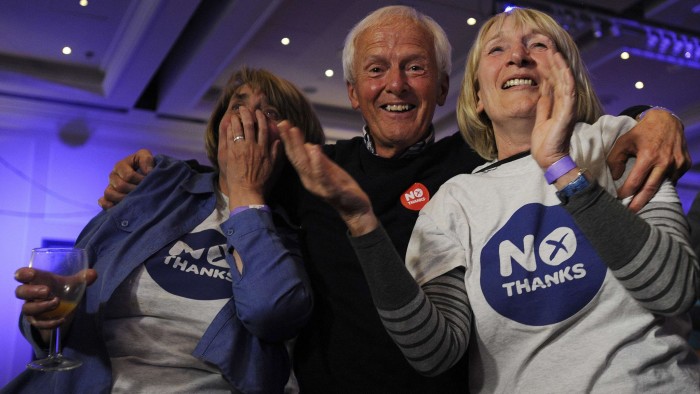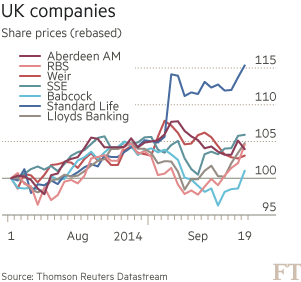Business relieved at Scottish result but concerns remain

Roula Khalaf, Editor of the FT, selects her favourite stories in this weekly newsletter.
By 6am on Friday businesses across the UK were exhaling a collective sigh of relief at the outcome of the Scottish referendum. But, as the day progressed, their initial reaction was tempered by worries about the uncertainties still looming in the future.
“It’s a victory for common sense and a recognition of the economic realities of the world in which we live,” said Terry Scuoler, chief executive of EEF, the organisation which represents roughly a quarter of the UK’s manufacturing businesses.
“We’re all relieved, because clearly it got very close,” said John Cridland, director-general of the CBI, the employers’ federation. “[But] such a difficult campaign inevitably leaves scars which will take time to heal.”
Mr Cridland said it was now necessary to resolve the issues the referendum had brought to the fore.
“Let’s understand what’s important about the union for business – it’s the single internal market, which must not be undermined by devolution.”
Simon Walker, director-general of the Institute of Directors, said: “There can be no doubt that many businesses will breathe a sigh of relief . . . and yet we know that significant changes are still on the cards.”
“There is now a job to be done to rebuild business confidence,” added James Sproule, chief economist at the IoD. “From the SNP in particular, we need to hear ‘yes, we are a party of the left, but we understand business’.”
The financial services industry welcomed the result, and the big Scottish-based banks, including Royal Bank of Scotland and Lloyds Banking Group, were quick to stress that their threats to relocate south of the border in the event of a Yes vote had vanished.
But insurer Standard Life hedged its bets, saying it would continue to consider its options after promises by Westminster politicians in the run-up to the vote to give Scotland more fiscal powers. Some analysts and investors suspect the banks may still be tempted to move south, although lenders say it would be too expensive.
Other business groups warned of the effect on confidence if politicians continued to stoke the independence debate.
“If there is any hint – as there was from Alex Salmond this morning – that the debate will go on, this will be very negative for Scotland and will create continuing uncertainty for investors,” said John Longworth, director-general of the British Chambers of Commerce.
Mr Longworth was one of many business voices on Friday calling for government to quash uncertainty over the constitutional future of the UK.
“There are lots of things that directly affect the health of the economy that are voted on by MPs in Westminster who are not elected by the people who are affected,” he said. “Any fudge on that issue will be unacceptable.”
Listed companies in continental Europe had been reticent about putting their views forward in the run-up to the referendum, for fear of offending both commercial and political sensibilities. But there was a palpable sense of relief among the business community in Germany, the region’s biggest economy.
“This is a good day for Europe and for the European idea,” said Dr Gunter Dunkel, chief executive of German Landesbank NordLB.
Mr Longworth at the BCC said the campaign had important lessons for the debate over UK membership of the EU, which the majority of his members wanted to preserve.
“It seems to me that our politicians have not shown themselves to be very good poker players in a high stakes game,” he said. “No doubt they panicked and gave quite a lot away. I hope when it comes to negotiating on the EU that they do a better job.”

Although there had been dissenting voices among the UK business community in the run-up to the referendum, Sir Mike Rake, CBI president, told the FT earlier this month that 90 per cent of Scottish businesses opposed independence.
Sir Mike said on Friday that the business environment was looking more stable: “We’ve had three big concerns – the Scottish referendum, the general election and the EU referendum. We’ve ticked one off.”
There was considerable controversy before the referendum over the contribution of businesses to the debate. While many had remained silent out of respect for the differing views of their staff and customers, others – such as Marks and Spencer and John Lewis – put themselves in the line of fire.
Mr Cridland said he believed companies had been effective in getting factual information across to voters, and that this was a step towards big business regaining the public’s trust after the blows dealt to it by the financial crisis.
“I think what this has told us is how important it is for business to speak up,” he said. He called on the business community to repeat the exercise during any forthcoming debate over the UK’s EU membership.
“Some of the same questions will arise and it will be important that business speaks to citizens in language that it finds convincing.”
Additional reporting by Martin Arnold, Peggy Hollinger, Patrick Jenkins and Jane Wild
Comments